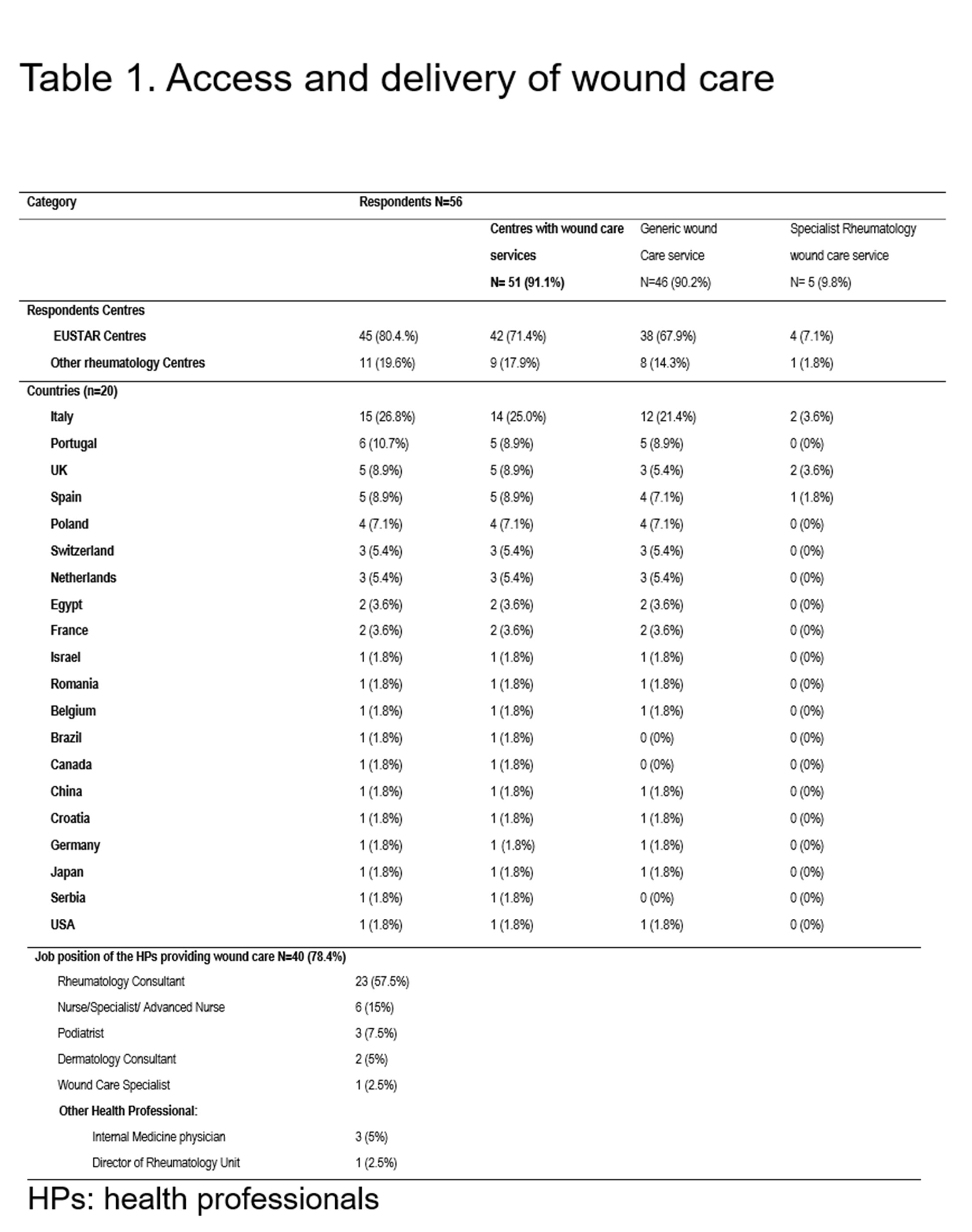Session Information
Session Type: Poster Session C
Session Time: 10:30AM-12:30PM
Background/Purpose: DUs affect around 50% of SSc patients, however access to specialist wound-care services has been identified as a patient’s unmet need. This international survey aims to assess the provision of SSc specialist wound-care services and the use of the recommended intervention sharp debridement.
Methods: An online survey was conducted during June-December 2024, targeting clinicians from European Scleroderma Trials and Research Group (EUSTAR) and other SSc specialist centres. It was disseminated via EUSTAR, LinkedIn, the British Society of Rheumatology SSc Specialist Interest Group and targeted email invitations to clinicians specialist in SSc. Data were analysed using descriptive statistics.
Results: Clinicians from 56 centres (20 countries), returned the survey (Table1). 51 (91.1%) had access to wound care services, of which only 5 (9.8%) were specialist wound care services. Out of the 51, 40 (78.4%) respondents delivered the local wound care themselves. When questioned about perceived efficacy of sharp debridement out of the 40, 17 (42.5%) rated it moderately effective, 13 (32.5%) very effective, 4 (10%) extremely effective, 4 (10%) slightly effective and 2 (5%) not effective at all. Only 25/40 (62.5%) used sharp debridement as a treatment (Table 2), 3 of them (12%) used it very frequently, 6 (24%) frequently, 5 (20%) moderately, 7 (28%) occasionally and 4 (16%) rarely. Of these 25, 23 (92%) reported positive outcomes (Table 2), faster healing was reported 7 times (30.4%), improve overall ulcer pain 4 (17.4%), infection control 4 (17.4%), wound overall improvement 3 (13%), wound treatment efficiency 3 (13%) and promoting epithelization 2 (8.7%). Only 8 out of 25 (32%) reported negative outcomes, interventional pain was reported 5 times (55%), increased inflammation 1 (11%), small wound bleeding 1 (11%), injury to healthy tissue due to poor debridement technique 1 (11%), and delayed healing 1 (11%).
Conclusion: Our survey has benchmarked that most of the surveyed international centres had access to wound care services, however, access to specialist wound care services remained limited. From all the centres that had access to wound care, around half reported to use the recommended intervention of sharp debridement for DU management. Although the majority of clinicians were in favour of the intervention, its frequency of use varied, which could be due to the lack of a standardised clinical protocol for its use. Our timely data highlight the need for collaborative efforts to establish best practices and evaluate the safety and efficacy of sharp debridement for SSc-DUs in randomized controlled trials.
 Table 1. Access and delivery of wound care
Table 1. Access and delivery of wound care
.jpg) Table 2. Sharp debridement use
Table 2. Sharp debridement use
To cite this abstract in AMA style:
Duarte Fernandes R, Estevez-Lopez F, Hughes M, Del Galdo F, Alcacer-Pitarch B. Specialist Wound Care Services Provision and Sharp Debridement Practices for Digital Ulcers (DU) Management in Systemic Sclerosis (SSc): An International Survey [abstract]. Arthritis Rheumatol. 2025; 77 (suppl 9). https://acrabstracts.org/abstract/specialist-wound-care-services-provision-and-sharp-debridement-practices-for-digital-ulcers-du-management-in-systemic-sclerosis-ssc-an-international-survey/. Accessed .« Back to ACR Convergence 2025
ACR Meeting Abstracts - https://acrabstracts.org/abstract/specialist-wound-care-services-provision-and-sharp-debridement-practices-for-digital-ulcers-du-management-in-systemic-sclerosis-ssc-an-international-survey/
